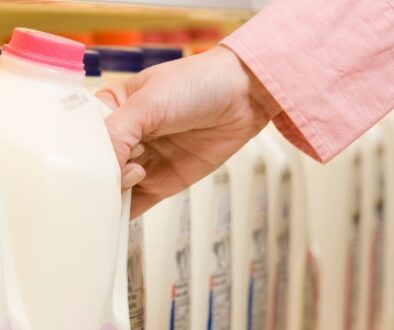Industry Hopes New Approach Will Help Dairy Trade
The United States plans to enforce China’s trade commitments made under the phase one agreement and restart a targeted tariff exclusion process to protect U.S. economic interests, said U.S. Trade Representative (USTR) Katherine Tai during a speech this week outlining the Biden-Harris administration’s new approach to the U.S.-China bilateral trade relationship.
In remarks presented Monday at the Center for Strategic and International Studies, Tai said that for too long, China’s lack of adherence to global trading norms has undercut the prosperity of Americans and others around the world.
“In recent years, Beijing has doubled down on its state-centered economic system,” she said. “It is increasingly clear that China’s plans do not include meaningful reforms to address these concerns that have been shared by the United States and many other countries.”
She added that while the phase one agreement, negotiated by the Trump administration, helped to stabilize the U.S. market and ease some tensions, it did not meaningfully address fundamental concerns with China’s trade practices and their harmful impacts on the U.S. economy, including the agriculture industry.
“While we have seen more exports to China in recent years, market share is shrinking and agriculture remains an unpredictable sector for U.S. farmers and ranchers who have come to rely heavily on this market,” Tai said in her speech. “China’s regulatory authorities continue to deploy measures that limit or threaten the market access for our producers — and their bottom line.”
Realign Trade Policies
She announced four main initial steps the administration will take to realign trade policies toward China to benefit U.S. priorities:
1. The United States will discuss China’s performance under the phase one agreement and enforce the commitments China made to benefit certain American industries, including agriculture.
2. While pursuing phase one enforcement, the United States will restart its targeted tariff exclusion process to mitigate the effects of certain Section 301 tariffs that raised costs on Americans.
3. Along with working to enforce terms of phase one, the United States will raise broader concerns with Beijing’s non-market policies and practices like abuse of state-owned
enterprises, anti-competitive behavior and subsidies, and the theft of intellectual property.
4. The United States will continue consulting and coordinating with allies and partners who share a strong interest in ensuring that the terms of competition are fair, work collectively to set the rules of the road for trade and technology in the 21st century, and strengthen the global market for U.S. workers and businesses.
“Our goal is to bring deliberative, stable, long-term thinking to our approach — and to work through bilateral and multilateral channels,” Tai said. “The core of our strategy is a commitment to ensuring we work with our allies to create fair and open markets.”
U.S. dairy industry leaders reacted to this announcement with hope and urged the administration to work toward more export opportunities to China.
Becky Rasdall, vice president of trade policy and international affairs for the International Dairy Foods Association (IDFA), notes China has been a top-five market for U.S. dairy exports for nearly 20 years, and with the U.S. milk supply continuing to increase, a mutually beneficial trade relationship with China — the largest potential market for dairy — is critical. However, she adds, China also must be held to account for its commitments and actions.
“That is why IDFA was pleased to hear Ambassador Tai’s pledge to enforce the commitments made by China under the phase one agreement and to remain vigilant in defending the interests of U.S. agriculture from any current or future trade-distorting practices,” Rasdall says. “China’s government-controlled market and overt interest in developing its own domestic sourcing and export capacity for food and agricultural products underscore the nation’s willingness and ability to turn off U.S. agricultural imports when convenient — a concerning trend pointing to the need for the United States to advance a deeper, more strategic position on trade policy with China.”
As the United States exports nearly 20% of its milk production, IDFA members rely more and more on effective U.S. trade policy to liberalize markets, provide preferential access and produce stable, rules-based trading opportunities for U.S. dairy exporters, Rasdall says.
“China will always need the productivity and reliability of U.S. food and agriculture producers,” she says. “Therefore, while the developments outlined (this week) by Ambassador Tai demonstrate this administration’s willingness to defend the interests of U.S. dairy, IDFA is hopeful for constructive efforts to facilitate trade with China. We look forward to collaborating with USTR and other agencies on efforts to ensure U.S. agriculture is best positioned in a competitive global marketplace.”
U.S. Dairy Export Council President and CEO Krysta Harden say the announced actions on tariffs will benefit U.S. dairy.
“What China does impacts dairy markets all around the world given what a large purchaser of dairy products they are,” she says. “American dairy farmers and manufacturers count on the ability for our products to meet China’s appetite for dairy, yet retaliatory tariffs continue to weigh down our prospects there. Long-term tariff waivers are critical to helping unlock more of the potential in that market. In addition, it’s key that the administration encourages China to boost its purchasing of major dairy commodities such as milk powder and cheese that it is still primarily sourcing from other suppliers.”
Dairy farmers welcome the administration’s new approach to the U.S.-China trade relationship, says National Milk Producers Federation President and CEO Jim Mulhern, noting China’s tremendous importance to global dairy markets.
“To date, China has delivered on the multiple dairy regulatory commitments they made in the phase one agreement. But retaliatory tariffs continue to put a drag on our sales, and our market share in key dairy commodities such as milk powder and cheese lags far behind that of our competitors,” Mulhern says. “We urge the administration to press China for substantial progress on these two fronts so that dairy farmers and cooperatives are better positioned to supply China’s growing dairy needs.”
Keep Up To Date On Cheese Industry News
Find all of HART Design & Manufacturing current industry news here.
Source: Cheese Market News




